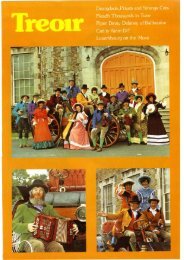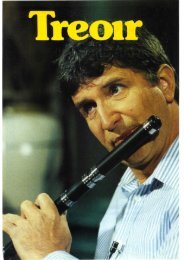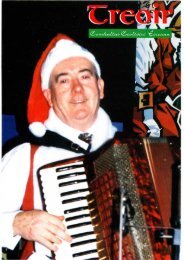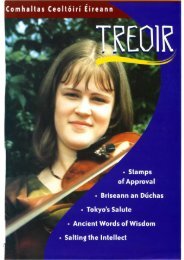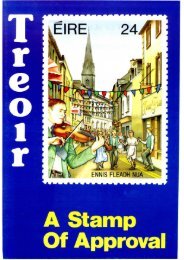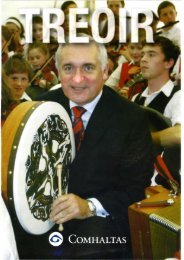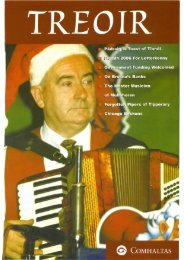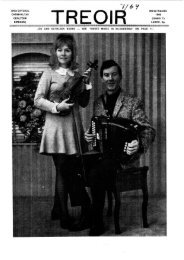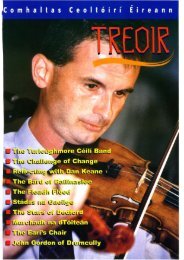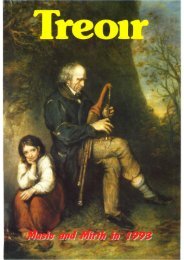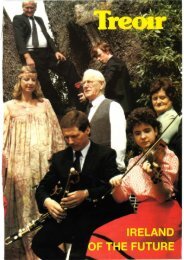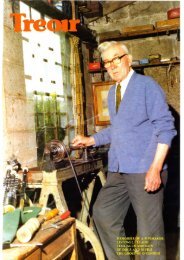Ãoslódáil (PDF) - Comhaltas Archive
Ãoslódáil (PDF) - Comhaltas Archive
Ãoslódáil (PDF) - Comhaltas Archive
Create successful ePaper yourself
Turn your PDF publications into a flip-book with our unique Google optimized e-Paper software.
TREOIR<br />
like the fiddle and flute, to the<br />
obscure. At the competition for lilting,<br />
a technique of singing nonsense<br />
syllables, similar to jazz scatting, a line<br />
of spectators stretched out the door.<br />
And plain old whistling sounded<br />
surprisingly graceful when applied to<br />
jigs and reels.<br />
The sound of the weekend, however,<br />
had to be the uilleann pipes<br />
(pronounced ILL-inn), a cousin of the<br />
bagpipes, which mix a light, reedy<br />
pitch for rollicking melodies with a<br />
bass drone for harmony.<br />
It was sometimes easy for the<br />
competitions to be overlooked. The<br />
exuberant traditional culture sprawled<br />
out in every direction and attracted<br />
220,000 people. Every hotel and bed<br />
and breakfast was full more than a week<br />
in advance; latecomers were advised to<br />
bring a tent and a sleeping bag.<br />
The town square, with colourful<br />
storefronts and two elegant stone<br />
church steeples, bustled for days.<br />
Clusters of musicians played impromptu<br />
sessions everywhere, and stalls sold<br />
compact discs, accordions, fiddles,<br />
garden gnomes, kitsch felt hats and,<br />
incongruously, household utensils like a<br />
'miracle' potato peeler. Police kept all<br />
traffic out, leaving the streets open for<br />
people to wander in the unexpected<br />
sunshine and incessant music.<br />
When the competitors finished their<br />
day's work - and many compete in<br />
more than one discipline - they took<br />
to the streets and the pubs. And while<br />
4,000 musicians take part in the<br />
recitals, 6,000 more arrive for no<br />
reason other than to play in<br />
spontaneous sessions. As a result<br />
Listowel's 3S bars - nearly one for<br />
every 100 residents - were bursting.<br />
The standard of music is high, even if<br />
the musical matchmaking sometimes<br />
goes awry. In the New Kingdom Bar<br />
on Sunday night, four accordion<br />
players found themselves crowded<br />
together with one bodhran player. The<br />
bodhran (pronounced BOW-rawn, as<br />
in 'taking a bow') is a one-sided goatskin<br />
drum beaten with a small twoheaded<br />
mallet in a flicking motion<br />
from the wrist. The bar's patrons<br />
didn't seem to mind that imbalance,<br />
and neither did the accordion players,<br />
turning out a flurry of jigs and reels.<br />
A mustachioed member of the bar<br />
staff took a break from serving drinks<br />
to enter the musicians' circle and sing<br />
three ballads. As he crouched on one<br />
knee, eyes closed and the veins on his<br />
neck bulging, people shushed their<br />
neighbours and the bar fell into a<br />
respectful silence.<br />
At times the dignity of the<br />
competitions was threatened by the<br />
pace and inebriation of the festivities,<br />
and families watching the last setdancing<br />
performances in the square<br />
occasionally had to negotiate through<br />
crowds spilling out of the pubs.<br />
But that contrast is essential to the<br />
nature of the Fleadh, said Labhrcis 6<br />
Murchu, Director of <strong>Comhaltas</strong><br />
Ceolt6irf Eireann (pronounced COALtuhs<br />
kyohl-TOR-ee AIR-in), the<br />
governing body for traditional Irish<br />
music. The conviviality and accessibility<br />
of the Fleadh, while unintentional,<br />
ensured that the event and the musical<br />
tradition behind it would not be seen<br />
as elitist. 'They find their own level, and<br />
they respect each other: he said of the<br />
revellers and the competitors. 'It's an<br />
organic thing, really. If we had tried to<br />
influence the views of young people on<br />
how to enjoy themselves, we would<br />
have lost our way:<br />
Fleadh Cheoil dates to 1951, when<br />
musicians founded <strong>Comhaltas</strong><br />
Ceolt6iri Eireann, which now has<br />
35,000 members in 400 branches<br />
worldwide. In addition to maintaining<br />
high musical standards through the<br />
competition, the Fleadh is an essential<br />
gathering point. Irish music evolved<br />
several regional styles before mass<br />
communication and transportation,<br />
said Brian Prior, <strong>Comhaltas</strong>'s head<br />
organiser for the Fleadh.<br />
The Clare and West Clare styles,<br />
which focus on the jig and reel, are<br />
best known because of the popular<br />
success of local fiddle players like<br />
Martin Hayes. But especially at a<br />
Fleadh in County Kerry, the Clare<br />
5<br />
style faces its Southern rival, the<br />
Sliabh Luachra (pronounced sleev<br />
LUA-krra) style, a reference to the<br />
poor quality of the land in Kerry,<br />
Cork and Limerick. Its adherents play<br />
more polkas and slides: songs in a<br />
different time signature and having a<br />
more lively feel. Because of their<br />
proximity to Scotland, musicians in<br />
Northwestern Donegal evolved the<br />
Highland style, which is 'fast and<br />
furious', Mr Prior said. 'An East Clare<br />
man wouldn't like it:<br />
And the Fleadh brings together more<br />
than just different styles of music. On<br />
Saturday afternoon an Englishman and<br />
a man with a heavy sing-song Kerry<br />
accent leaned against a car and<br />
argued about violin fingerings. Every<br />
type of Irish accent could be heard:<br />
North Dublin, South Dublin, Cork,<br />
Kerry, Donegal, as well as Belfast and<br />
other parts of Northern Ireland. 'The<br />
music belongs to all political<br />
traditions on this Island,' said Mr 6<br />
Murchu, who is also a senator in the<br />
Irish Parliament. That point could be<br />
made quite clear next year since<br />
<strong>Comhaltas</strong> is considering a location in<br />
Northern Ireland for the Fleadh.



